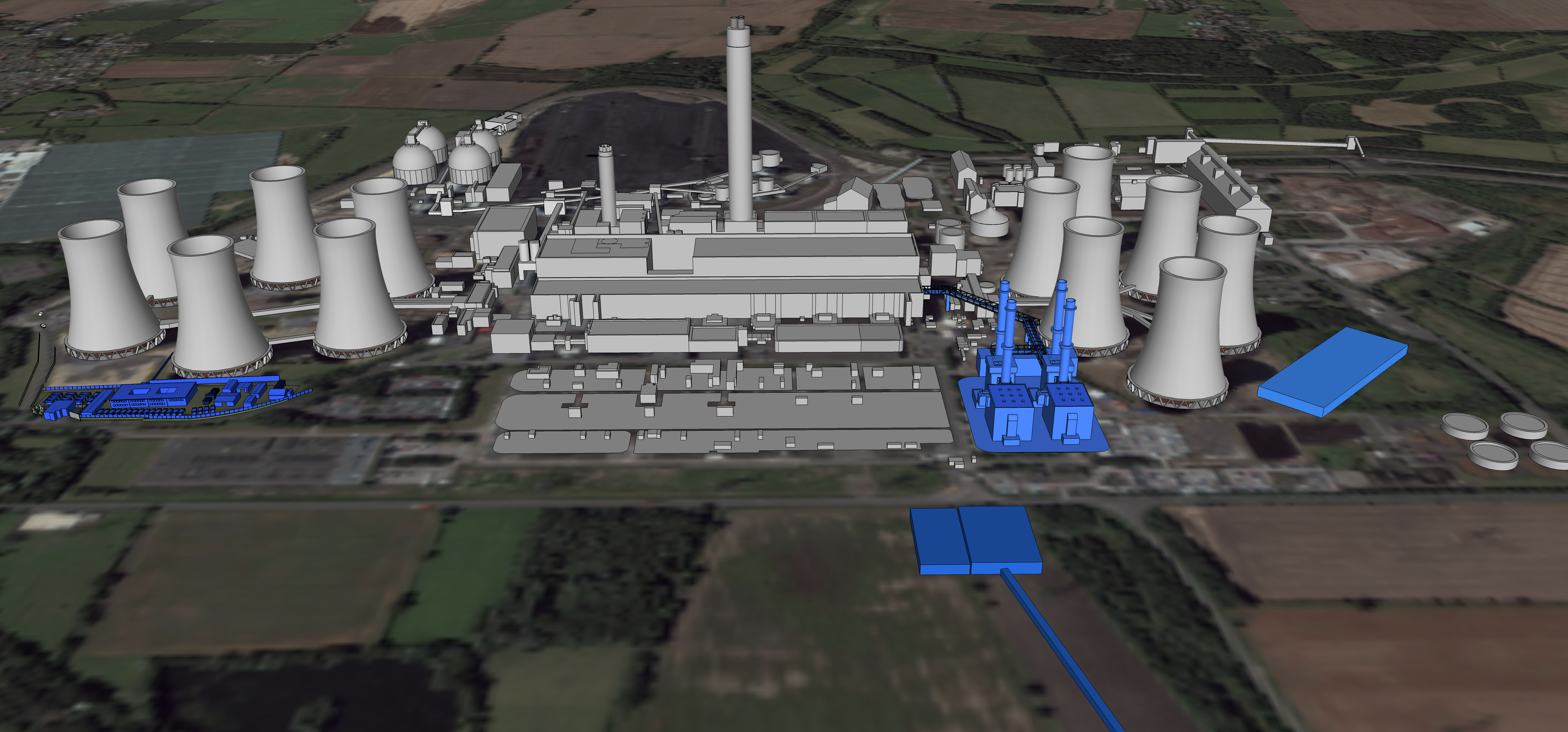
Great Britain’s fairy lights and roasted turkeys were powered by the cleanest electricity mix ever on Christmas day 2017 – rounding off a record breaking year for power generation in Britain.
According to analysis of Electric Insights data by researchers at Imperial College London, in collaboration with Drax, 2017 is on course to be the cleanest year for electricity generation.
Carbon emissions from power generation were just 142g/kWh on Christmas Day – more than 10% lower than on December 25 2016.
Gas generators provided over 30% of the required capacity and coal provided just 1.4% on Christmas Day – compared to 17.9% for gas and 7.1% for coal in 2016.

Roasted turkeys were powered by the greenest electricity mix ever in 2017
Dr Iain Staffell of Imperial College London said: “This was achieved in spite of generation from renewables being lower than on Christmas Day last year; mainly due to the continued reduction in coal over this year, being swapped for gas power stations.”
The low carbon Christmas comes after a whole host of renewables records were broken throughout the year and with much less coal on the system, helping to reduce Britain’s carbon emissions by around half of what they were five years ago.
Dr Staffell explained: “The carbon intensity of Britain’s electricity halved between 2012 and 2016 and we think that by New Year the 2017 figure will be at least another 10% lower than last year’s record. This means the average British household produced 100 kg less CO2 this year than they did last year without having to lift a finger, all the changes are being made ‘behind the scenes’.”
Electric Insights data also shows that January 17 2017 was the ‘dirtiest’ day of the year, with carbon intensity reaching 398g CO2/kWh. Despite this, Britain’s carbon emissions have fallen sharply as renewables records were broken throughout the year.
Dr Staffell said: “Several real milestones were reached by renewable electricity throughout 2017 – we set a new record in March for renewable generation, which was then broken again in June.
“It helped that wind speeds were relatively high during the year, so wind farm output was up by around one third compared to last year. Also, electricity demand was a little lower, meaning that renewable output formed a bigger part of the mix.”
The records broken throughout the year include:
- February was a record breaking month for biomass with 2.1GW produced from biomass generation
- A new record for wind, solar, hydro and biomass power was made in the first three months of 2017, with 23.2% of Britain’s power coming from these technologies over the first quarter.
- However, this record was then broken again in the next three months, with almost a quarter of the UK’s electricity between April and June being generated sustainably – wind, solar, hydro and biomass accounted for 24.9% of the UK’s energy mix.
- No coal was used in power stations for the first time in more than 130 years on April 22nd Dr Iain Staffell of Imperial College London added: “This was a huge milestone: the first day in which no electricity came from coal since the first steam-driven power station opened in the 1880s.”
- On 26th May, a new solar record was made, with 3.1GW of energy produced throughout the day from solar – almost triple the yearly average of 1.2GW per day. Dr Staffell said: “A great deal of new solar has been installed on the system which meant that the previous record was smashed.”
- June was the cleanest month of the year, with 188g per kwh of carbon emitted, compared to 339g per kwh in January – the dirtiest month. Dr Staffell, said: “This is due to demand being lower, so we could make do with very little coal generation, and gas was much lower too.”
- 8th December saw a new record for wind energy, with 11.6GW of electricity from wind power produced over the day. Dr Staffell explained: “As with solar electricity, new capacity made it easy for the previous wind power record to be broken. 2017 was also a very windy year compared to 2016.”
- Interconnectors also had a record-breaking year, with the link to France reaching new highs for both imports and exports. 26th March saw 1,994MW imported into Britain from France, while conversely 16th November saw 2,020MW exported from Britain to France.
Andy Koss, Drax Power CEO said: “Britain’s energy system is rapidly changing, as the Carbon Price Floor continues to force coal off the system and gas and renewables play an increasingly important role in helping to reduce carbon emissions – all year round.
“At Drax we have upgraded half of the power station to run on flexible, reliable, sustainable biomass. Around 70% of the power we produce is now renewable – enough for four million households.
“We are also looking at repowering two of our remaining coal generating units with gas to provide up to 3.6GW of power and developing up to 200MW of battery storage.
“With the four rapid response gas power stations we are developing, which will help to support the system and enable more renewables onto the grid, here at Drax we are playing an important part in helping to change the way energy is generated, supplied and used for a better future.”
ENDS
Media contacts:
Ali Lewis
Drax Group Head of Media Relations
T: 01757 612165
Editor’s notes
Data from Electric Insights comparing demand, emissions and generation on Christmas day in 2016 and 2017 – these are averages of both Christmas Days not totals:
Previous analysis of data from Electric Insights revealed that four years ago, Britain sat in the middle of the ‘Low Carbon Electricity League’. Britain now ranks 7th in the world, following a 47% drop in emissions last year.
Electricity generation in the UK is playing a vital role in the reduction of carbon emissions, enabling other sectors like transport to become greener. Fewer fossil fuels on the system means electric vehicles are greener than ever before .
The electricity sector has many accounting conventions to be aware of. Power flow is measured in gigawatts (GW), volumes of energy are measured in megawatt-hours (MWh). Producing 1 GW constantly for an hour would give 1 GWh = 1000 MWh. Producing 1 GW constantly for a year would give 8760 GWh, which is enough to power 2.65 million homes.
About Electric Insights
- Electric Insights Quarterly was commissioned by Drax and is delivered independently by a team of academics from Imperial College London, facilitated by the College’s consultancy company – Imperial Consultants. The reports analyse raw data that is made publicly available by National Grid and Elexon, which run the electricity and balancing market respectively. Released four times a year, the reports focus on supply and demand, prices, emissions, the performance of the various generation technologies and the network that connects them.
- Along with Dr Iain Staffell, the team from Imperial included Professors Richard Green and Tim Green, experts in energy economics and electrical engineering, and Dr Rob Gross who contributed expertise in energy policy. The work to date has revealed scope for further research in this area, to inform both government and organisations within the energy industry.
- The quarterly reports are backed by an interactive website electricinsights.co.uk which provides live data from 2009 until the present. It was designed by The Economist Group’s independent data design agency, Signal Noise.
- Total emissions are calculated from British electricity consumption in tonnes per hour (including emissions from imported power), and the ‘carbon intensity’ of electricity – total emissions divided by total demand in grams per kilowatt hour (g/kWh).
About Drax
Drax Group plc plays a vital role in helping change the way energy is generated, supplied and used as the UK moves to a low carbon future. Its 2,300-strong staff operate across three principal areas of activity – electricity generation, electricity sales to business customers and compressed wood pellet production.
The Group includes:
Drax Power Ltd, which operates the largest power station in the UK, based at Selby, North Yorkshire and supplies 7 percent of the country’s electricity needs. The energy firm converted from burning coal to become a predominantly biomass-fuelled electricity generator. Drax is the biggest single site renewable generator in the UK and the largest decarbonisation project in Europe.
Haven Power, based in Ipswich, provides businesses with electricity.
Opus Energy, based in Oxford, Northampton and Cardiff, provides electricity and gas to businesses.
Drax Biomass, is based in the US and manufactures compressed wood pellets produced from sustainably managed working forests.
For more information visit www.drax.com










